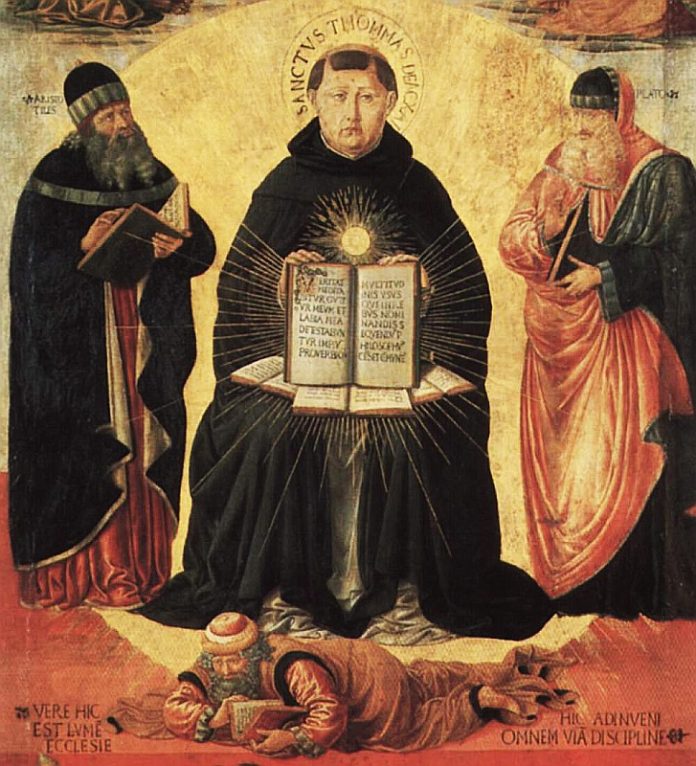Today is the anniversary of the death of Saint Thomas Aquinas. In March of 1274, he fell ill on his way to the second Council of Lyons, and so retired to the Cistercian monastery of Fossanuova where he recited a commentary on the Song of Songs for the grateful monks, in the midst which he went to his eternal reward in his fiftieth year, leaving behind a corpus of writing nearly miraculous in their scope, breadth and clarity. This used to be his feast day, but was moved after the Second Vatican Council to a day outside of Lent – the 28th of January, commemorating the transfer of his relics to the Dominican Convent of the Jacobins in Toulouse in 1369; there they rested until the French Revolution in 1789, when they were moved again to the Basilica of Saint Sernin in Toulouse until 1974, when they were moved back to the convent of the Jacobins, where they rest to this day.
We will never tire writing of Saint Thomas, as his doctrine is the backbone to the intellectual foundation of the Church, something Saint John Paul II, following any number of other Pontiffs, Doctors and theologians still filled with salt have reiterated since his death. The rational structure he offered for theology, that synthesis between faith and reason, has been indispensable, and the neglect of him, and his writing, we have fallen into a subjective, emotional mush – houses built on sand – which cannot stand against the buffets of the world and the devil. Sadly, this is where so much not only of the Church, but the rest of society, is at present, in her doctrine, her academic formation, her liturgy, and what often passes for ‘pastoral’ guidance. Saint Thomas once said that the hallmark of a trained intellect was the capacity to make the proper distinctions, which allow one to see the truth of things, right down to their essence.
Need we point out that this is being lost, a loss against which Pope Saint Pius X warned over a century ago in his encyclical Pascendi against the insidious heresy of modernism: That without Thomas, and the scholastic system, we would lose the capacity to reason properly, or even reason at all?
In the words of Pope John Paul in his Thomistically-grounded masterpiece, Fides et Ratio – choosing amongst any number of encomia heaped over the centuries upon the humble, quiet Dominican.
This is why the Church has been justified in consistently proposing Saint Thomas as a master of thought and a model of the right way to do theology (#43)
Indeed. And what follows soon after:
The Magisterium’s intention has always been to show how Saint Thomas is an authentic model for all who seek the truth. In his thinking, the demands of reason and the power of faith found the most elevated synthesis ever attained by human thought, for he could defend the radical newness introduced by Revelation without ever demeaning the venture proper to reason. (#78).
Ah, yes, the most elevated synthesis ever attained by human thought. But Thomas admitted that he learned more at the foot of the Cross than he did from all the books and lectures he absorbed (and he absorbed quite a bit), for clarity of mind can only derive from charity in the will. Orthodoxy and orthopraxy go together harmoniously, or perish miserably apart.
The American author Flannery O’Connor reminisced in her letters on her daily perusal of Thomas’ magnum opus, his Summa Theologica:
I couldn’t make any judgment on the Summa, except to say this: I read it every night before I go to bed. If my mother were to come in during the process and say, “Turn off that light. It’s late” I with lifted finger and broad, bland, beatific expression, would reply, “On the contrary, I answer that the light, being eternal and limitless, cannot be turned off. Shut your eyes, “ or some other such thing.
And she goes on to reiterate what all can gather from Thomas’ gentle, yet forceful and clear, words:
I feel I can personally guarantee that St. Thomas loved God because for the life of I cannot help loving Saint Thomas.
And would that we all would so love Saint Thomas.
Let us leave it there for now, for we will return soon to the Angelic and Universal Doctor with a few words about the political shenanigans in Ottawa.











